|
Choosing a Comfy Armchair Ageing bodies change shape and our favourite seats may not be suitable anymore. Believe it or not, having the right armchair may make the difference between staying independent or not! If you find it hard to get out of a chair once in it, you're less inclined to get out of it, until you have to. Getting in and out of chairs helps keep our legs strong, assists us to keep our sense of balance and encourages exercise, which is good for most of our bodily functions. 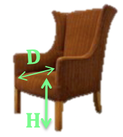 When choosing an armchair consider these things: a) Height: For comfort and ease of getting out of the chair:
b) Width: There needs to be a space of 2-3 fingers either side of the body to allow wriggle room and to keep the armrests comfortable. c) Depth: The depth needs to ensure a good upright posture and for ease of getting out of the chair
d) Back rest: Needs to:
e) Arm rests: Need to:
f) The chair surface needs to:
It’s important to have the main user sit in the chairs for some time and get out of it a number of times before deciding which to purchase.
If you need any advice on purchasing a suitable chair our friendly physios and occupational therapists can help, contact us as follows: Ph: 03 377 5280 Email: [email protected] Website: www.therapyprofessionals.co.nz Assisting someone to walk Keeping older people mobile and on their feet is good for families, their carers and the older person. The more people can do for themselves the less physical strain there is on the carer. Often carers try to help older people get up from sitting and walk by hooking the older person under the arm, which could easily damage the older person and the carer’s shoulders. The other mistakes we often make are:
If you want to assist an older person walk, first we need them to stand. Just follow the guidelines: 
- shuffle their bottom forward in the chair - place legs shoulder width apart - tuck feet under chair - lean forward, feet on the floor, nose over toes 
- on the count of "ready, steady, stand" ask them to push up through their hands and feet to stand  Walk the person while holding them with your arm across their back and hand on their bottom or hip. Their shoulder should be sandwiched firmly between your shoulder and hand. They may use a walking stick or walker. You may wish to use a hand grip instead of the shoulder sandwich hold. Hand grip Have your hand open upwards and allow the person to grab it. If you can avoid them grabbing your thumb do so especially if the older person has dementia Hearing Loss Causes Communication Breakdown At any age hearing loss negatively effects communication. During early childhood hearing loss, if not picked up, can delay children’s speech and language development significantly. Often poor speech clarity or language development is the first thing parents will notice. However if parents and others around young children can watch for the following milestones they may pick up a hearing problem early and be able to act quickly. Expected Milestones for babies 3 months
6 months
 9 months
12 months
18 months
24 months
If you notice any of these milestones are not being met see your doctor and get your child’s ears tested. In older children it is more difficult to identify hearing loss because their speech skills are already developed. Nevertheless, these guidelines may help detect a possible hearing loss. The child:
You just have a feeling, but you can't put your finger on what your concern is. Don't let that stop you. Ask your doctor for a referral to ease your mind. Hearing loss can occur throughout adulthood with one in two adults over 65 years experiencing hearing loss, particularly with higher pitched sounds. Hearing loss causes frustration and communication problems regardless of age. If you think someone is deaf around you ensure they get their hearing checked regularly, there is likely to be a solution to either solve or reduce the impact of their hearing loss Some guidelines on speaking to someone who’s deaf
Therapy Professionals Ltd Phone No: (03) 377 5280 Email: [email protected] Website: www.therapyprofessionals.co.nz Footwear Matters Here at Therapy Professionals we know the value of comfortable feet. Good footwear is important throughout life, however, as we age it becomes even more important. Poor footwear can cause foot, back and knee pain, and discomfort from corns, calluses and fungal infections. High heels and sloppy fitting shoes can affect our balance and walking, making us prone to falls. Any of these make us less inclined to walk affecting our health, wellbeing and independence. To avoid pain and discomfort caused by ill-fitting shoes and to maintain your fitness and independence as long as possible, just follow this advice from our friendly Physiotherapists. As we age our feet change shape and become larger so it’s important to get your feet re- sized when you are buying new shoes. Here are some tips on buying shoes: The essential components of good shoes are that they:
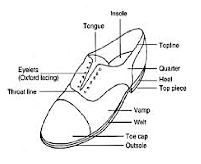 The shoe
If you need advice about the best type of footwear for you, Therapy Professionals friendly Physiotherapists can help, just contact us
Phone No: (03) 377 5280 Email: [email protected] RADIO NZ COMMENT & ANALYSIS DISABILITY Welcome, Whaikaha - Ministry of Disabled People. Still, challenges remain 3:12 pm on 4 July 2022 Share this By Chris Ford * Opinion - On Friday last week, the disability community of Aotearoa welcomed the launch of Whaikaha - Ministry of Disabled People. It was a day that disabled people, including myself, had waited a long time for. Finally, our own ministry has come into being, the realisation of much collective advocacy over nearly 40 years. 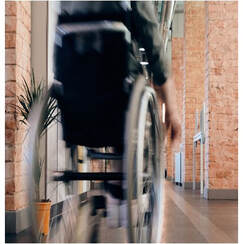 Photo: Pixabay / befunky.com As I watched online the official pōwhiri to open the new ministry, I reflected back on the day in 1988 when I moved a motion at a Labour Party Youth Conference that the then fourth Labour government establish such an entity. Unbeknownst to me, many other disabled individuals and organisations were doing the same, most notably, Disabled Persons Assembly (DPA), the organisation I now work for. All of these calls went unheeded for decades, that is until the outcomes of the present Labour government's Health and Disability System Review were handed down in June 2020. Admittedly, the review report came out just as the country and the world were in the first round of the fight against Covid-19, but that did not stop disabled people from stating that the outcomes of the review excluded us and it was time for disability to be separated from the health sector - where it had been since the National government's health reforms of the 1990s - once and for all. In fact, I wrote my first opinion piece for RNZ on this very subject. This concerted advocacy finally led late last year to the Cabinet decision that we would get the new ministry that we as the disability community had long yearned for and that it would be an independent, stand-alone entity, with initial support coming from the Ministry for Social Development (MSD). The government also vested responsibility for the approximately $1 billion per year disability support services budget - something that had previously been managed within the Ministry of Health - to the new ministry. The road to the new ministry has not been all smooth sailing, however. In late 2021, just as the country was about to head into the festive break, MSD announced the appointment of a non-disabled person, Justine Cornwall, to temporarily head it. I and many other disabled community leaders openly criticised this choice, given it violated one of the core tenets of the disability rights movement of 'nothing about us, without us' in that any decisions on disability-related matters should be taken by disabled people ourselves. I can say that all this advocacy has paid off with the Public Service Commission stating that their preferred candidate for the permanent chief executive role is a disabled person who cannot (due to needing to be released from their current employment) take up the role at present. While it's disappointing this person cannot start straight away, it's still very heartening the appointee will be a disabled person - probably only the second disabled person that I know of to head a government agency in this country. This is something to savour and celebrate and I look forward to finding out who the appointee will be.
The new ministry has been charged with, for example, leading the rollout of the Enabling Good Lives (EGL) principles around delivering disability supports to ensure they become more flexible and responsive to disabled people around the country.
The ministry will also oversee the passage of accessibility legislation which - while it's great to have - could still lack teeth, a concern causing a great deal of anxiety in the disability community ahead of its introduction to Parliament later this month. It could prove to be the ministry's first real test as a new entity. Moreover, I hope they will provide strong advice on how to resolve the longstanding inequities between disabled clients of ACC and Ministry of Health disability support services, the huge pay and employment gaps which exist between disabled and non-disabled people, the enduring poverty that many disabled people confront on a daily basis, and the lack of representation of disabled people at all levels of government and much else besides. I have been disappointed to see, though, that the issues of housing for disabled people will not be placed with the new ministry. I do hope, though, that the new ministry will be able to work alongside existing government agencies to effect policy change which will flow across the whole of government. In this respect, I think of the influence that the Ministry for Women has had since its inception in the mid-1980s, having furnished advice which has begun to narrow the gender pay gap (albeit, slowly) and ensure more opportunities for women emerge within the economy and wider society. Realistically, these changes are going to take time to filter through. I do understand that to a large extent no single government institution can effect change on its own. Collective grassroots disability advocacy and activism has gotten us this new ministry and other wins for disabled people down the decades. I have little doubt that flaxroots activism and advocacy will continue to lead the way as it has always done for disabled people and other marginalised communities. This activism will mean that Whaikaha, the Ministry of Disabled People, will be scrutinised over its actions from day one, that being last Friday. This means disabled people and our organisations will be seeking to working alongside the new ministry whilst, at the same time, holding it accountable. Inevitably, this will mean that from time to time it might be criticised by disabled people like me, especially if it strays too far from its mission around the need to have disabled people at the centre of its policymaking and other operations. These considerations are the minimum bottom lines that our new ministry must maintain if it is to retain its credibility and relationships with the disability community going forward. For now, though, Friday marked the beginning of a new era for disabled people in this country in that we now have a policymaking voice dedicated to us and one that will carry our voice even further into the hallways of power where we have not been fully heard in the past. The new ministry is a world first and it is my hope that it will lead the way for other countries to follow in our wake. I hope that in doing so that Whaikaha - Ministry of Disabled People will live up to its historic names and mission. Nau mai, haere mai, welcome, Whaikaha - Ministry of Disabled People. * Chris Ford is a Dunedin-based freelance writer and disability advocate. He currently works for Disabled Persons Assembly (DPA) New Zealand and as a research assistant for two universities. However, the views expressed in this article are wholly his own. |
AuthorShonagh O'Hagan Archives
July 2024
|


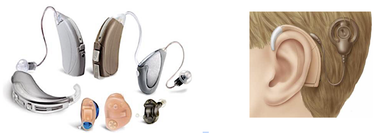
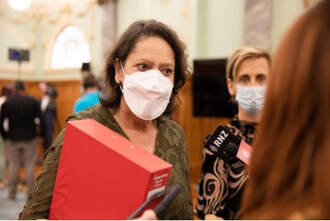
 RSS Feed
RSS Feed